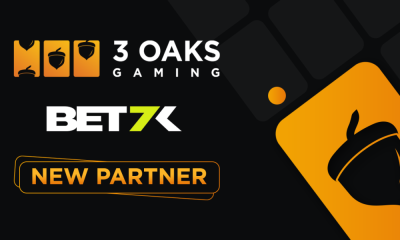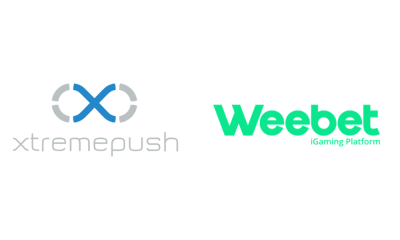Interviews
Exclusive Q&A with Michael Hudson, CEO and Co-Founder of GameBake

We have here with us an entrepreneur who started out quite early in gaming.
Michael Hudson, CEO and Co-Founder of GameBake, talks here about a host of topics:
- His beginnings as a game developer, his quest to develop a ‘fair, transparent, platform agnostic solution” that allows seamless publishing of games across platforms;
- His instinct of “running away from the light” and looking for “fringe areas”;
- What game developers can expect from GameBake;
- And about the gaming industry across the globe.
This is a bit longer than our usual interviews. But it contains nuanced perspectives expressed in straightforward language that the whole industry should look up and take note.
Over to the interview now!
Q. To start off, tell us about your career. Our readers love to hear top entrepreneurs talk about themselves, especially someone who became one at the age of 13!
A. 13 definitely feels like a lifetime ago now! But yes, I started my career in the games industry at 13 although my life as an entrepreneur goes back a little further than that. Since day one, I’ve always tried to make money – some way, somehow, from car washing to selling sweets at school (the demand was there, with only “healthy” options available at lunch times!)
Like they are for many of us, games have always been of keen interest to me, but unlike most, I always wanted to find out what makes a game and how I could make my own. I think it’s those kinds of questions that I’ve always asked that lead me towards teaching myself how to first build websites to host flash games, and then how to actually build the games themselves.
I first started exploring game development with a tool called GameMaker which is still around today, albeit much more developed than when I started with it all those years ago. Eventually I transitioned to working with Flash and building games for websites such as Newgrounds, which eventually led me to the sponsorship/licensing model and how I made my first $200 licensing my first flash game. My next flash game made over $15,000 in fees and that is when I started to take things a little more seriously because big numbers were involved. Considering I had turned down King (yes, the same King that went on to develop the hit we all know and love) I was clearly starting to move towards developing my hobby into a legit business, in a very natural way.
Since then it has been a rollercoaster with ups, downs and many loops, but it has led me to where I am today, with an amazing team (and now, friends), where we can be part of and help build the future of the gaming industry.
Q. How and why did you co-found GameBake? And what does the name signify?
A. GameBake was born out of a genuine business need. As developers, we’ve learned that it’s best to knuckle down and focus on a single product, a single goal that we can all work hard on to achieve great things.
As developers under our previous studio name, we worked on many projects, from hyper-casual games (before that became an industry term) right down to free-to-play titles. This experience was amazing but always positioned us in a similar place. Our publishers wanted the games to be playable everywhere but we only had so much manpower and hours in the day to actually achieve the lofty goals being asked of us. Integrated 3, 4 or 5 SDKs is annoying enough, but having to do that plus integrate the tech of every single platform plus find new services that work on and with these platforms plus making a new specific version for each platform (and all of that with no centralised system to easily and efficiently track everything), well, it wasn’t great, let’s leave it at that.
GameBake was a product of all of this. Our internal struggles and frustrations that led us to seeing a need in the market that, not only we wanted to solve, but many others wanted a solution for, and that is why we pivoted away from a development studio to go all-in with our KILN technology that allows us to open up the whole gaming market to developers globally, no matter how big or small you are.
What does the name signify? Well, we were named Yello at the very start so GameBake was part of our development as we pushed forwards into new markets and started using better technology. GameBake itself doesn’t have a specific meaning behind it, but for us, it describes what we do in one word, which is: baking games with the technology needed for everybody to access new amazing platforms and markets globally.
Q. How exactly does GameBake work? What kind of support can a gaming developer and publisher expect from your company?
A. How the tech works behind the scenes is probably a question more for our amazing CTO, so maybe you’ll find out in the next interview! But the concept is pretty simple really:-
• Upload your APK to GameBake, the very same APK used for uploading to Google Play;
• Check the boxes for the services your game uses; E.g. GameAnalytics, Tenjin, or Firebase, Adjust and so on;
• Check which stores you want to deploy to, e.g. Huawei AppGallery;
• Job done! Our tech (called KILN) takes care of the rest and spits out a compiled version of your game with all the required tech needed to run on the chosen platforms you are looking to distribute to.
Of course, store pages need to be built for each platform and IDs from other services need to be swapped for new IDs from those services, but for the new platforms you go live on. We are working closely with most of the big industry players to try and automate as much of this as possible and we are well on our way to achieving this.
As for what to expect from GameBake, well I would say a fair, transparent, platform agnostic solution that works! If you want to use our tech to make getting to new platforms easier, but want to make partnerships with the platforms yourself (i.e. setup features yourself and so on), that is fine, we are able to facilitate this and will do all we can to provide what you need with who you need. If what you are looking for is a more hands-on approach from us, one where we setup all your games features, run the UA and more then we can also work with you like that as well.
For GameBake, flexibility is key as we see the technology and ecosystem we are building becoming a vital piece of the development puzzle that will enable easy and commercially viable ways to distribute and scale globally.
Q. Changing the status quo of game distribution is not just unglamorous but kind of swimming against the tide too. What motivated you to choose that path?
A. That is a great way of putting it, although I may go a step further and say it’s more like climbing up a waterfall. I have always been interested in the more fringe areas of any industry, especially within gaming. That may be because I can’t help but look at the potential of anything, but it could also be somewhat from necessity – as when launching our own games we never had huge marketing budgets to compete with so I and the team have had to look into areas that were cost effective.
Over the years, what I have found is that everybody always runs towards the light and it’s the ones running away from the light that are called crazy, but if everybody is standing around that light then it very quickly gets blocked. In short – the people running towards the light will find it very hard to find their way towards it. While those running away, and normally that’s in a different direction to everyone else, will normally find themselves in a niche but lucrative area that they can dominate. It’s only once that light starts burning brighter that others pay attention.
This is how I see distribution right now. The bright light is iOS and Google Play on mobile, with many other options, but all faded into the darkness. And now, the bright lights are glowing and the industry is starting to take notice of what is possible outside of the norm. Now it won’t be instantaneous, but we are seeing growth everyday and the more we all work together to open up these platforms and these markets, the greater the industry as a whole – and the more opportunity there will be for everybody globally to enter and become successful.
Q. What are the options available for games developers outside the duopoly of Google Play store and Apple Appstore as publishing platforms? Importantly, what are the attractions for the developers to opt for such off the beaten path destinations?
A. For those developing native games for mobile (Apps, basically) I would suggest looking into the alternative android market. I personally don’t like the word “alternative” as it gives off a vibe of these platforms being “lesser” than Google Play and this frankly isn’t the case, but we need to describe these stores somehow. These stores are low hanging fruit for most people, as if you can compile an APK, which you can, then you can deploy on these stores and the 100s of millions of users that they have.
Now, I’m not saying that this is an easy feat, or an approach that will guarantee success, far from it, but why you wouldn’t secure your brand and IP, and take advantage of these amazing platforms, makes no sense. To me, It’s a no brainer! Often, what we hear from the market is not that developers don’t want to distribute to these stores, but that they’re faced by complexities in being able to achieve this and in making it commercially viable. GameBake is fixing the headache faced by developers by providing an easy route to deploy to these stores, whilst providing the means to be able to leverage the services required in today’s industry to monetise and scale games effectively.
Outside of the App Stores, there are still a wealth of opportunities. In this space, you need to think carefully about the technology you are building your game in, because web distribution generally means HTML5 games, and for many this just isn’t an option. The opportunities on the web are amazing if approached in the right way, but it takes some time to port and for many it just isn’t worth the time and effort commercially.
The same goes for social/instant gaming platforms, such as Facebook, WeChat, Snap and many more. Your games need to be in HTML5 but more importantly, you need to think about how you approach each of these platforms. You can’t just launch a game and expect it to scale, you need to launch it under the platforms features and leverage them to really take advantage of what makes each of these platforms special.
For me, the opportunities are huge but the barrier to entry is also just as big with tons of awkward tech to integrate, porting games being required and the biggest barrier is the lack of services to allow you to properly scale your game but again, that is what we are here for and we are building. If you want to deploy to stores, port to HTML5, explore new markets and leverage your current service partners to do all of this, you can do – with GameBake.
Q. How can games profit from social media platforms like Facebook Gaming?
A. This is something I am asked a lot and the answer is simple because it is no different than a game on the App Store. If your game monetises via Facebook Ads, you can leverage Facebook Audience Network to monetise it, if done via purchases, then you can use the platforms payments system. Nothing drastic needs to change in how you monetise, I mean you don’t need to start asking for donations, because there is no other way.
I guess the real question here is ‘what are the best ways to monetise on social platforms such as Facebook?’. This is a difficult one to provide a rounded answer to that will please everybody but hopefully the below will help:-
• If you are leveraging IAPs then keep in mind that Apple “currently” stops payments being processed on these platforms if playing from an iOS device. We have all seen the recent news stories though so I expect this to change over the next 12 months opening iAPs up across platforms. Until then though, just keep this in mind.
• Hyper-Casual games have an advantage on social platforms as they have such a broad target audience which makes it “simpler” to make these games go viral. That being said, not all gameplay mechanics work and this must be considered when launching on a platform such as Facebook or Snap. Just because a game was a hit in the App Store, it doesn’t mean you can just throw the game as is on social platforms and expect it to work.
• When launching any game on social platforms, just think about how to leverage that platform’s features. For example, Facebook has a tournament mode that allows players to start tournaments that are playable directly from their timeline. With the right setup and design this can be used to get players sharing with friends which can create a viral UA channel to your game. Most social platforms have specific features like this and you need to leverage them to bring users to your game, keep them engaged and coming back and of course, then monetise them.
Q. What can be done to minimize the hurdles of finance and resource that game developers face while optimizing the games for different platforms? How near are we to a software alchemy that makes games publishing-ready for different platforms?
A. Of course I’m going to say that the time is right now – with GameBake! There are no integrations required, meaning access to all supported Android channels via a single upload. We are still working hard to make this even more simple so developers globally can focus on what’s important and that is creating amazing games. Also, HTML5 platforms still have a big barrier to entry for most but again, GameBake is working hard to solve this to provide a way for developers to easily access these platforms and deploy easily to them all.
There is never going to be a way for developers to not put in any work at all. Success comes from hard work and this still rings true when targeting new platforms, be that new app stores opr social platforms, you need to research and find out who the end users are downloading and playing your games on any given platform and then adapt what you do to engage (and of course monetise said users). There isn’t a solution to stop resources being required for game design, monetisation or user acquisition but, how we see it, these are the pieces of the puzzle that studios want to keep control of. It is the deployment that is a pain in the arse mixed with a lack of a real ecosystem, it makes it near impossible to even consider distribution outside of the core stores. This is what we want to and are solving, simplifying and improving the pieces of the puzzle that are needed for studios globally to take advantage of and focus their resources and efforts on creating, managing and scaling amazing games.
Q. How are the games you work with received and played outside the marquee markets of Europe and North America? Any significant development in Asia, Africa, Australia or South America?
A. It’s a hard question to answer as it is so different for every game and you need to tackle each game on a somewhat market by market basis. In general, a game that is enjoyed in the US is likely to be enjoyed in India as well, I mean we are all humans at the end of the day, the difference comes in when trying to find success at scale in specific markets and on specific platforms.
China is probably the best example to use here because the market is huge, but it is notoriously difficult to enter without properly understanding the intricacies of the market itself. By this I mean it isn’t just localising your games text that you need to think about, but how your game looks and plays, how it is distributed to players in the market and how you can monetise it. Markets, like China’s, have restrictions on games and you need to plan how you will tackle all of this to be able to enter.
China is an extreme case, but other markets do need similar considerations when it comes to localisation. But you also need to bear in mind that your distribution strategy for Apple and Google aren’t the number one everywhere. In India, for example, Google Play is big but there are many other platforms that open up 100s of millions of users. Iran is another market with restrictions in place, therefore Google Play does not work there, so working with local stores is your entry into a market of over 70 million. Russia is another market where you need to understand the local platforms and how players play games to really localise a game properly and effectively.
So going back to what I’d said at the start, a great game is a great game no matter where you launch in the world, but making a commercial success of that game in various markets requires some thought, planning and good execution.
Q. Asia perhaps deserves more focus as a gaming market. Which Asian countries do you reckon have the most potential market as games industry markets?
A. I completely agree, Asia is mostly forgotten by western developers and it’s a shame as the potential across the region is massive. China is the world’s biggest gaming market but that is the market everyone talks about so let’s put that to one side as it isn’t an easy nut to crack.
If I were to suggest markets that have the potential for most developers of casual games to grow in the coming months and years, I would look to a market such as Indonesia where the scale you can achieve in that market alone is huge. However, a lot of the time, it just isn’t commercially viable and therefore not thought about, but with the right knowledge and partners you can access more platforms that really open up a market like this and can turn what is a good market for Google Play games into a very strong one for those thinking outside of the box.
South Korea and Japan are both strong markets for specific genres but again, you need to really think about how you approach these markets. In general, Asia as a whole has amazing potential, as well as many other regions globally.
Q. Are tight regulations or lack of clear-cut regulations a bottleneck for growth of gaming outside Europe and North America? We’d love your insight into the role regulations play in the gaming industry’s growth.
A. Regulations always hinder growth, it is the nature of regulations but of course, sometimes they are necessary. China takes it to another level! I can’t even imagine how big that market would be right now if they didn’t have these tight regulations holding it back. I understand the reasons behind why the government has set them in place (although for “Children’s health” isn’t the real reason, in my opinion) but it is holding back the market’s growth which is a big shame.
I do see the need for regulation sometimes though, for example, to stop Apple and Google tightening their grip on the market and forcing us all into paying a huge tax on the games that have been worked on so hard to get them where they are. Therefore regulations can probably help the market grow in certain cases but overall, the less governments get involved in the industry the better for the industry’s growth in the coming years.
Q. And finally, how do you get your hair so beautiful?
A. It’s all natural
Powered by WPeMatico
Interviews
The Full Spectrum Strategy: How Betting on Both Popular and Lesser-Known Sports Pays Off
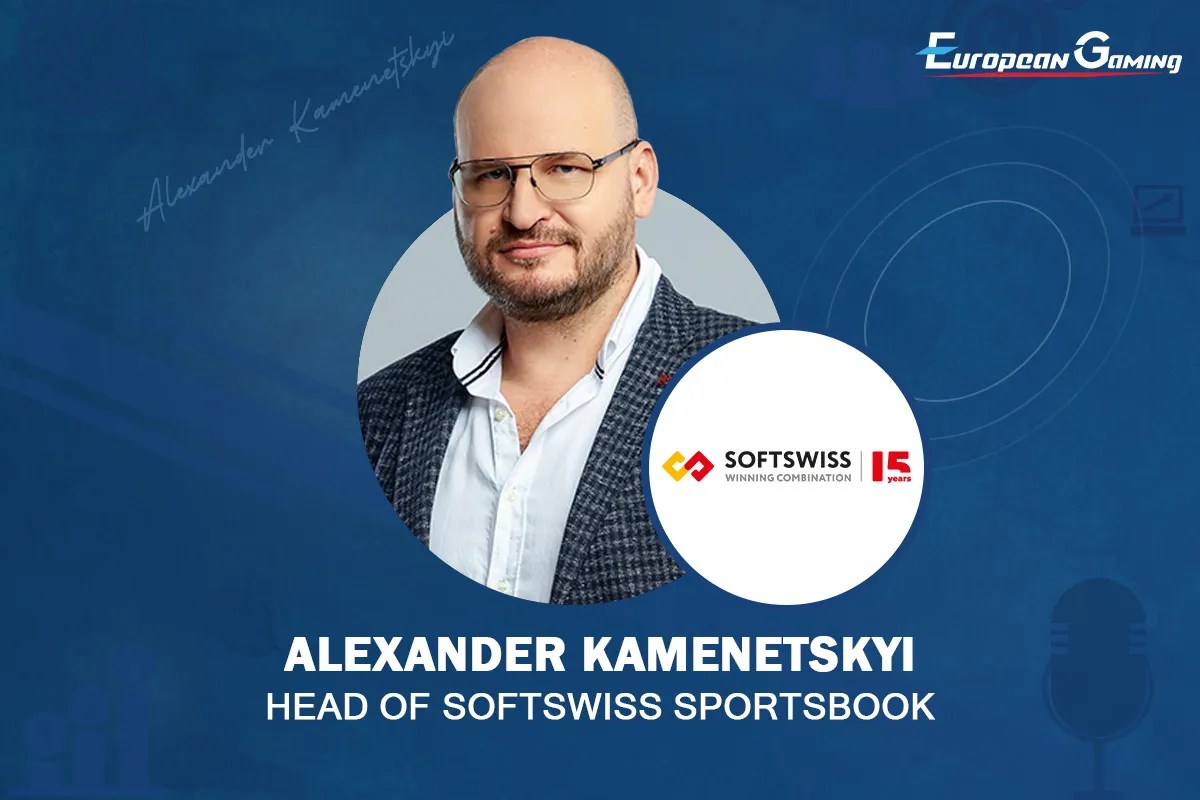
In an insightful interview with Alexander Kamenetskyi, Head of SOFTSWISS Sportsbook, we delve into the complex balance between promoting mainstream sports events and exploring niche markets in the betting world. This strategy enhances profitability and ensures a steady engagement across diverse betting markets, crucial for maintaining a dynamic and resilient business model in the competitive world of sports betting.
How should operators balance promoting popular sports events versus niche ones?
The effective strategy in betting is to diversify wagers across a broad range of sports events and markets. This approach helps minimise fluctuations in outcomes, enhancing both the profitability and predictability of your betting business.
Based on this, we recommend that operators promote all sports comprehensively to maintain steady activity and turnover. This ensures that players remain engaged with alternative options, even during periods lacking major events.
It’s crucial not only to focus on popular events like top football matches or major NBA tournaments but also to spotlight less mainstream sports such as water polo, badminton, and Formula 1. For instance, Australian football is notably underappreciated despite offering unique scheduling advantages that can be leveraged during off-peak times to attract bets.
How can you choose sports that have the best chance of attracting your audience?
To effectively capture your audience’s attention, it’s crucial to identify alternative events during periods when popular events like the Champions League are not happening. Our strategy involves actively promoting these alternatives to familiarise players with new tournaments and sports.
We have two dedicated teams: one that selects potential events and advises operators on what to highlight, while the other crafts promotional campaigns to ensure these events resonate with your audience.
The primary factors we consider when selecting events are Total Bets and the number of bets placed on a specific event or tournament. Popularity is our second criterion, which we measure by comparing the turnover to the number of participating players.
For instance, if there are no football championships over a weekend due to Euro qualifying matches, we might suggest promoting NBA evening games or volleyball tournaments to fill the gap left by high-profile football events.
However, it’s also beneficial to occasionally promote sports other than football, even when popular football matches are available. This strategy helps diversify the betting habits of the audience, which is vital for maintaining a stable and engaging product.
How far in advance do you need to start working on a promotional campaign?
We typically share promotional materials with operators two weeks prior to the event. This timeframe usually provides ample opportunity for operators to finalise the text and graphics. If we opt to use bonuses as the main promotional tool, we generate the rules, bonuses, and banners automatically. It’s then up to the operator to create and either self-publish the content or do so with our assistance.
What promotional channels would you recommend focusing on?
Operators have a variety of tools at their disposal, from email and SMS campaigns to managing their own channels on Telegram and other messaging platforms where they can share updates, offer bonuses, and more. Many even offer additional bonuses for subscribers of these communities, which proves effective in building a targeted and loyal audience interested in your project’s bonuses.
Another effective strategy involves placing promotional banners on various sections of the operator’s website, such as the homepage, event pages, and user dashboards. Additionally, collaborating with influencers like streamers can significantly boost traffic.
It’s also crucial not to overlook the power of email newsletters. When crafting content for these, it’s important to consider user behaviour and device preferences. For instance, with over 90% of our current revenue coming from mobile devices, it’s safe to assume most emails will be opened on a smartphone. Thus, optimising for mobile viewing is key. Our tests show that simple, structured, and transparent offers tend to perform best – you only have a few seconds to capture the player’s attention and persuade them to click through.
Do promotions without financial incentives like bonuses still work?
Let’s be clear: bonuses and promotions are fundamental to attracting players, especially those who rely on luck to multiply their capital. Seen as lucky breaks, bonuses allow participation without direct cost. Properly integrated into the marketing strategy, these incentives not only maintain player interest but significantly enhance financial performance.
For example, if an operator earns 15% from express bets, they can afford to redistribute 5% of that as bonuses, slightly reducing their margin to 10%, but potentially increasing user engagement and solving other operational issues.
Furthermore, promotions enable operators to direct betting activity efficiently. While major events naturally draw attention, incorporating bonuses for lesser-known events like the World Curling Championship can broaden a player’s interest and betting activities, introducing them to new sports and betting markets. This strategy not only diversifies the player’s experience but also stabilises the operator’s financials by spreading funds across various sports, thereby reducing the impact of financial peaks and troughs during major events.
Some operators focus primarily on significant events, leading to considerable financial volatility. For example, many faced challenges during the European Football Championship qualification matches when favourites won, negatively impacting financial outcomes. Operators that engage their audience across a spectrum of events tend to experience more stable performance.
Ultimately, using high-profile events to attract new players while promoting a diverse range of smaller events can create a more robust and diversified betting environment. This approach mitigates risks and cultivates a more engaged and knowledgeable betting community.
How likely is it that a person who came to a particular event will continue engaging with you afterwards? What influence can an operator have during this time?
Welcome packages with various bonuses are highly effective in this scenario. The primary goal is to familiarise new players with the range of bonuses and sports offered. Ideally, the entrance bonus program should provide about 20-30% to engage the player effectively.
Besides the welcome package, we can implement trigger-based rules during major events. For instance, a new player might come for the World Cup, and we could offer a promotion like: “Win three World Cup bets and receive a free bet for Wimbledon.”
Once engaged, they might notice a dominant player like Djokovic and place a bet on tennis, triggering another promotion. For example, we could offer a 50% bonus for making an express bet with specific odds on three tennis events. This showcases our diverse bonus system and introduces new sports gradually.
Furthermore, promoting sports tends to be easier than casinos because there are more events and thus more opportunities to engage players through channels like email newsletters, with less risk of being flagged for spam.
We advise our operators to customise bonuses for specific player demographics – like promoting Brazilian tennis players to Brazilian users or Nigerian athletes to Nigerian users. This targeted approach is significantly more effective than generic offers and resonates even with experienced casino players.
However, it’s crucial for operators to view their offerings holistically; they don’t just have a casino or sports section, but a comprehensive project where every part should function seamlessly together, including promotions and the product’s internal functionality.
The post The Full Spectrum Strategy: How Betting on Both Popular and Lesser-Known Sports Pays Off appeared first on European Gaming Industry News.
Interviews
Tom Galanis: giving a First Look at the Top of the Slots
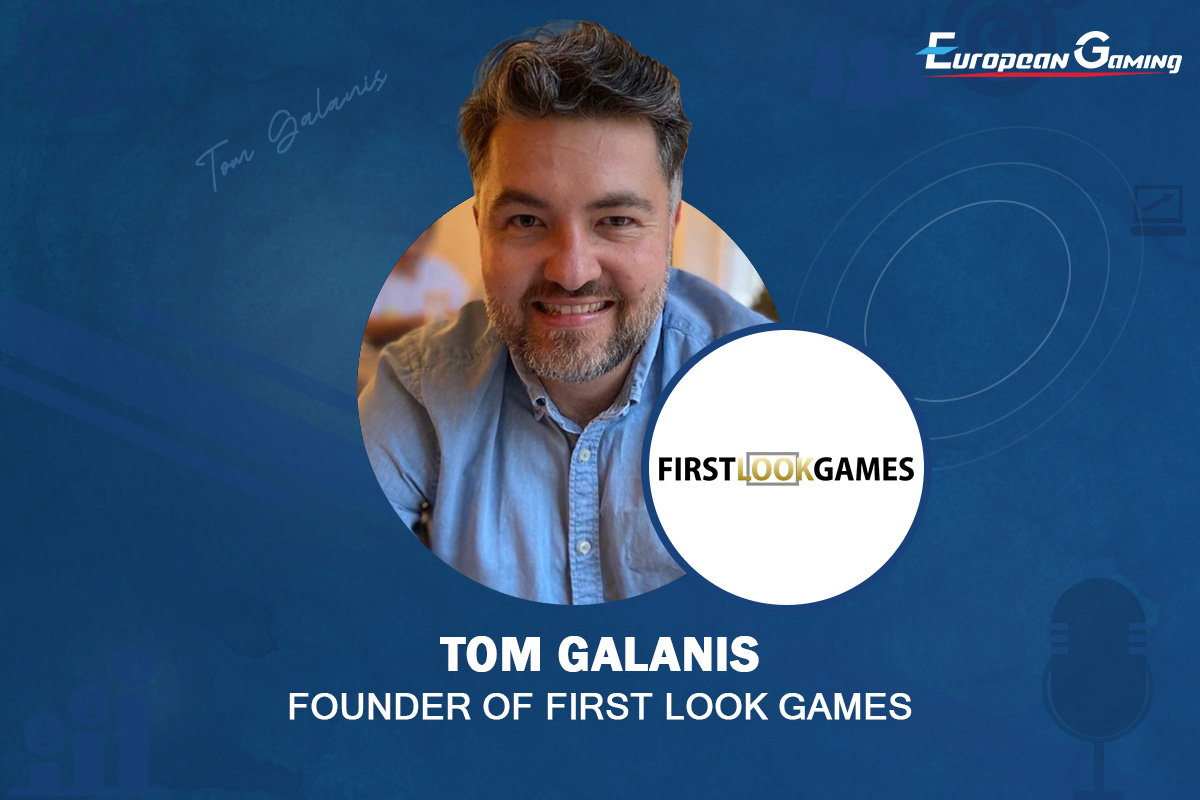
Gone are the days when we would spend a Thursday evening waiting for Top of the Pops to come on our televisions so that we could see who would be performing that week. The music show may no longer be running, but First Look Games has taken inspiration from the long-running staple and added a slot spin, to create Top of the Slots.
To give us more insight, First Look Games Founder Tom Galanis walks us through the ideation process behind Top of the Slots and how this is helping to give an accurate representation of the top-performing slot titles each month.
You launched Top of the Slots by First Look Games a couple of weeks ago. For those that may have missed the launch, what does this involve?
Tom Galanis: Top of the Slots is a showcase for the top 10 games launched by game studios via the First Look Games platform over the previous 90 days. It’s a never-before-seen take on game popularity and one our game studio partners, and affiliate users are already loving!
What was the thought process behind launching Top of the Slots?
Tom Galanis: First Look Games captures unique data for our game studio partners and Top of the Slots is designed to illustrate the most successful games, benchmarked by this unique data insight, to the industry.
What do game providers have to do to make it into the top ten releases for the month? What metrics do you use to evaluate success?
Tom Galanis: In order to make it in to the top 10, game studios need to release titles via our platform that successfully resonate with the 850+ affiliates that utilise First Look Games, making full use of the suite of tools we offer on and outside of the platform to engage affiliate marketers in the promotion of their game. The rankings are based on the First Look Games Index for all games launched to the market in the preceding 90 days, which combines:
- a) Downloads – which is the aggregated total of download sessions amongst affiliates on the platform. Affiliates download assets including logos, game sheets, video files, screenshots, banners and game artwork;
- b) Hits – this is the aggregated total number of game reviews for the game, created by affiliates using the First Look Games platform;
- c) Reach – this is the aggregated unique visitor count of the websites containing the Hits;
- d) Demo Game Sessions – this is the number of free to play demo game sessions that have taken place from iFrames placed on Hits.
- e) Sentiment Score – this is the average sentiment score from Hits
The games that rank well in this index are obviously commercially successful in their own right but are also being reviewed by affiliates because of the engagement of the game studio with the First Look Games platform, and consequently, with affiliates.
Our most active game studios are not just releasing great games with frequency but are also ensuring their game and studio news is distributed across the First Look Games platform and social channels and that a full and diverse range of marketing assets and game information is being provided through the platform prior to a game’s release. This best equips affiliates to understand the features of a game so that they can successfully convey this to their player audience, which, collectively amongst FLG affiliates, is very significant, totalling more than 20 million slots players worldwide.
Tell us a bit more about the First Look Games sentiment analysis – how is this helping to remove the biases from the ranking process? What data do you use to inform this analysis?
Tom Galanis: Once our technology has identified a new game review, First Look Games uses Natural Language Processing to ‘read’ the review and assess what the affiliate makes of the game. We share a short snapshot of this with the game studio and assign a score to the review based on how positive the affiliate has been in their review of the game. The more positive the language used in the review, the higher the score.
Sentiment scores are then aggregated across all reviews of the game to give a score for the game, and across all games to give the studio a score to benchmark against peers. Using AI, we are able to objectify the subjective to provide true 360 analysis on how affiliates are promoting a game.
What can we expect to see from First Look Games for the remainder of this year?
Tom Galanis: We have a perpetual roadmap of both new studio launches and technical advancements of the platform for affiliates and game studios to look forward to!
The post Tom Galanis: giving a First Look at the Top of the Slots appeared first on European Gaming Industry News.
Interviews
Exclusive Q&A w/ Steven Paton, Commercial Director at Wise Gaming
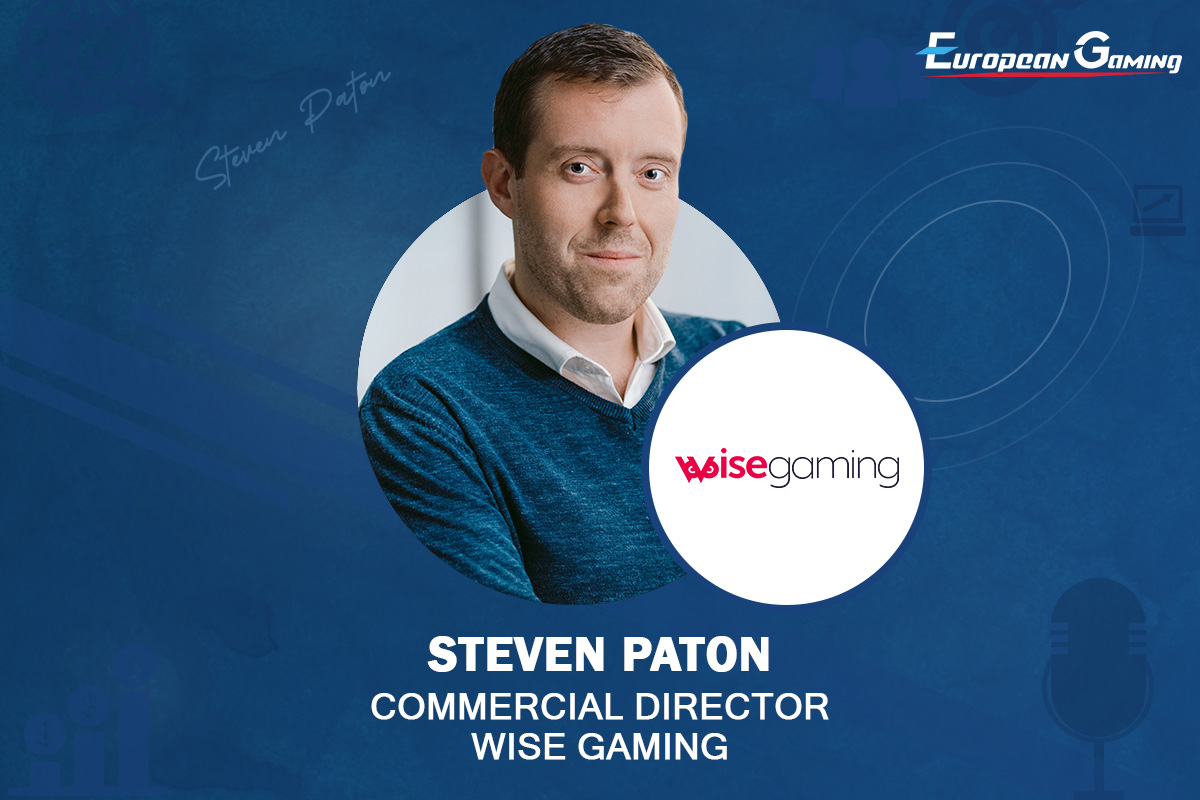
Could you describe the range of products and services that Wise Gaming offers? What makes them unique or appealing to potential clients?
Wise Gaming is the fastest-growing, Complete platform offering both White-Label & Turnkey Solutions. The Wise Gaming solutions are built from our team’s extensive experience: 15 years B2C and 10 years B2B. We know the importance of a truly modular approach, allowing our partner the ability to obtain our entire solution or individual components to enhance what they already have.
In what regions or markets does Wise Gaming primarily operate? Are there any plans for expansion into new territories?
Our focus has been on both the European & LatAm Continents. With enormous success in our B2C operations, we are relying on our extensive experience. We believe the balance between established & emerging markets brings both knowledge and the ability to learn and adapt, truly focusing on our partners needs without limitations.
2025 will be Wise Gaming’s year of expansion! 2024‘s goal is about building on our success in EU & LatAm whilst planning next years’ growth in both Africa & Asia.
What technologies does Wise Gaming employ to deliver its iGaming solutions? Can you highlight any proprietary technologies or platforms that differentiate your offerings?
From our 15 years of B2C success, we felt that we understood both the pleasure points and pain points that most operators face on a daily & weekly basis. Therefore, we build our Wise Gaming solutions with a customer-centric approach, How can we support our partners to support their customers. We diligently sourced the industry’s best-in-class providers for both our Sportsbook & Casino content, utilizing Enterprise software to provide the most robust offering in the iGaming industry.
Our dedicated in-house teams visualize, build and enhance our Proprietary systems for each of our Partner’s needs, making each of our partners brands Unique.
In what ways does Wise Gaming prioritise security and data protection within its technology infrastructure?
As previously mentioned, our customer-centric approach is vitally important to Wise Gaming and our Partners! Providing the correct technology and experience to our partners is key to having a successful KYC, AML, Due Diligence and Data Protection process. We opted for Amazon AWS solutioning to provide market-leading security, Encrypted databases & data storage, penetration resilience, DDoS attack elimination, dedicated Back-Office segmentation and User-based access, protecting player data while safeguarding our partners operations.
What are the current trends or challenges you’re seeing in the iGaming market? How is Wise Gaming adapting to these changes?
The speed in which technology advances is always a challenge for any provider. The key is to know your markets, the players, the accessibility of online entertainment such a sports betting & casinos and implement the technology that meets these variables. Everyone is talking about AI & Machine learning, and rightly so! With such advancements AI & Machine Learning models, it would be irresponsible not to utilize them. Whether it’s for Player customisation, Events based recommendation or supporting operational needs such as RG, KYC & AML, AI & machine Learning should be used to ENHANCE human interaction, not replace. At Wise Gaming, we have already implemented AI & Machine Learning models to provide the unique edge to our partners.
Also localized content is important. Every market is its own unique playground with their own specific cultural identities. Knowing these identities and becoming an expert in these will not only assist in the acquisition of players, it signifies a brand’s genuineness and authenticity to that market and allows greater player retention. At Wise Gaming we have already implemented A.I & Machine Learning models
How does Wise Gaming ensure compliance with regulations in various jurisdictions? How important is regulatory adherence in your sales approach?
I will answer these 2 questions together. The market is experiencing a shift in regulation, and compliance. MGA & CGA license domination has been challenged, with more and more markets opting for tighter safety measures and implementing their own self-regulated approach. This brings safety to players and trust.
Working alongside regulators will always help, and more importantly, we can learn from each other. Adhering to regulation is ultimately for a player’s safety and that is paramount for the industry’s longevity. Wise Gaming continuously enhances its platform to conform with regulations, making it safe and reliable for our partners.
What are the key factors potential clients considering when choosing an iGaming provider, and how does Wise Gaming address these factors in its offerings?
As previously mentioned, experience and knowledge are key attributes from both an operational and technical aspect. “You can’t plant apple trees and expect to get oranges!” Wise Gaming’s experience & knowledge puts us, and our partners, at the forefront of each market, allowing substantial growth and higher ROI.
Time to market should also be a priority. Whilst most Providers offer 2-4 months implementation time, Wise Gaming can deploy your platform within 2-4 weeks, giving us the competitive edge in a highly competitive space.
How does Wise Gaming incorporate feedback from clients into product development and improvement?
Experience and knowledge are simply 1’s learning over time. Our approach at Wise Gaming is that of a learning mentality, “you are never too old to learn!” iGaming is rich in experts – We trust our Partners, and they trust us, it’s the unification that builds long-term partnerships. We have 2 ears and 1 mouth, use them in that order!
What are the future goals and plans for Wise Gaming? Any upcoming innovations or developments you can share?
Our goal is to continue providing a reliable and robust platform, listening and delivering an innovative and unique solution for each of our Partners.
Innovative Developments – If we tell everyone, they won’t be innovative 😉 However, what I can say is that we are focused on “advanced”, real-time localised AI recommended content both Casino & Sportsbook.
The post Exclusive Q&A w/ Steven Paton, Commercial Director at Wise Gaming appeared first on European Gaming Industry News.
-

 Baltics5 days ago
Baltics5 days agoMARE BALTICUM Gaming & TECH Summit Announces Final Agenda for 2024 Event
-

 Australia5 days ago
Australia5 days agoACMA Reveals Illegal Gambling Crackdown Results
-

 AGCO5 days ago
AGCO5 days agoAGCO Requires Ontario Gaming Operators to Stop Offering WBA Bets Due to Integrity Concerns
-

 3 Oaks Gaming5 days ago
3 Oaks Gaming5 days ago3 Oaks Gaming extends Brazilian outreach with Bet7k partnership
-

 Africa5 days ago
Africa5 days agoNE Group powers 888bets launch in Angola
-

 Latest News4 days ago
Latest News4 days agoINSPIRED LAUNCHES VIRTUAL SPORTS WITH COMEON GROUP
-

 Álvaro Camargo Country Manager Brazil at Xtremepush.5 days ago
Álvaro Camargo Country Manager Brazil at Xtremepush.5 days agoXtremepush boosts Brazilian presence with Weebet platform deal
-

 Compliance Updates4 days ago
Compliance Updates4 days agoHub88 granted supplier licence in Peru











